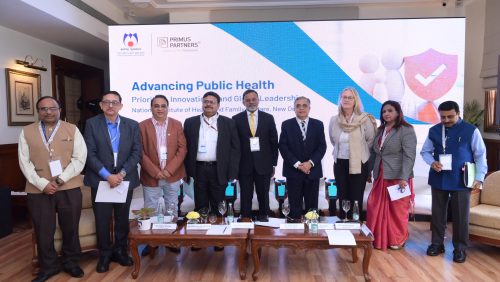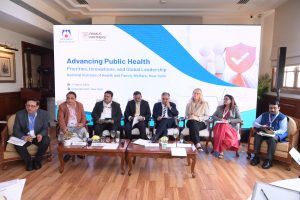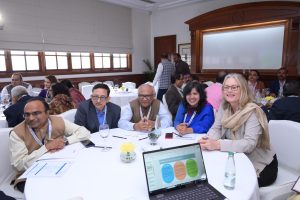
Advancing Public Health: Priorities, Innovations & Global Leadership
Insights from NIHFW’s Strategic Meeting in New Delhi
On March 1, 2025, the National Institute of Health & Family Welfare (NIFHW), in collaboration with Primus Partners, convened a strategic meeting in New Delhi to discuss priorities, innovations, and global leadership in public health. NIHFW, an autonomous institution under the Ministry of Health and Family Welfare (MoHFW), plays a pivotal role in capacity building and training for healthcare, allied healthcare, and public health professionals across the country. The meeting served as a platform to discuss strategies for strengthening India’s healthcare workforce and integrating cutting-edge innovations to enhance service delivery.
The event commenced with keynote addresses by Anupriya Patel, Minister of State at the Ministry of Health and Family Welfare, and Vijay Nehra, Joint Secretary, MoHFW. They emphasized the importance of a skilled and adaptive workforce that can respond to emerging health challenges, technological advancements, and policy reforms. Strengthening this workforce is essential to improving service delivery, enhancing health systems, and achieving national and global health goals.
Panel Discussion: Innovations and Global Best Practices in Public Health
 Following the inaugural session, a panel discussion brought together distinguished experts and policymakers to examine strategic innovations, policy interventions, and global best practices that can reinforce India’s healthcare system. The panel featured renowned leaders, including Dr. Vikas Bhatia (AIIMS Bibinagar), Dr. Pradeep Khasnobis (MoHFW), Dr. Santhosh Matthew (Gates Foundation), Dr. N.K. Sethi (Ex-NIHFW & Planning Commission), Dr. Sara Bennett (Bloomberg School of Public Health, Johns Hopkins University), Dr. Sudha Goel (NITI Aayog), and Dr. Ranjan Das (NCDC). Their insights provided a roadmap for strengthening India’s healthcare ecosystem by integrating global best practices with local innovations.
Following the inaugural session, a panel discussion brought together distinguished experts and policymakers to examine strategic innovations, policy interventions, and global best practices that can reinforce India’s healthcare system. The panel featured renowned leaders, including Dr. Vikas Bhatia (AIIMS Bibinagar), Dr. Pradeep Khasnobis (MoHFW), Dr. Santhosh Matthew (Gates Foundation), Dr. N.K. Sethi (Ex-NIHFW & Planning Commission), Dr. Sara Bennett (Bloomberg School of Public Health, Johns Hopkins University), Dr. Sudha Goel (NITI Aayog), and Dr. Ranjan Das (NCDC). Their insights provided a roadmap for strengthening India’s healthcare ecosystem by integrating global best practices with local innovations.
Dr. Sara Bennett, Professor at the Bloomberg School of Public Health and Co-Chair of the Johns Hopkins Gupta-Klinsky India Institute, brought a global perspective to the panel discussion with her extensive expertise in health systems strengthening, policy implementation, and capacity building, Dr. Bennett emphasized the critical role of institutional resilience, workforce development, and data-driven decision-making in advancing public health in India.
Dr. Bennett also shared insights on global best practices in health systems governance, drawing from her extensive research and experience with low- and middle-income countries. She stressed the value of evidence-based policymaking and the need to foster leadership within India’s public health institutions to drive sustainable improvements in healthcare access and outcomes.

Subsequently, the participants and panelists deliberated on some of the critical challenges within the domain of training and capacity building of human resources for health. Key discussions centered on the need to bolster India’s public health institutions through policy reforms, technology-driven innovations, and collaborative approaches to disease surveillance and healthcare resilience. Experts underscored the importance of leveraging artificial intelligence, data science, and digital health solutions to enhance service delivery.
This engaging discussion reaffirmed the significance of cross-sectoral collaboration in addressing public health challenges and shaping a more resilient, technology-driven healthcare future for India. GKII remains committed to supporting India’s healthcare transformation through research, policy engagement, and collaboration with key stakeholders.